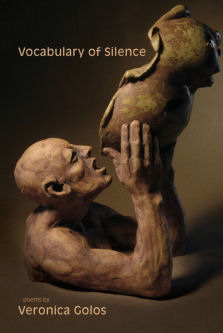nycBigCityLit.com the rivers of it, abridged


Reviews
VOCABULARY OF SILENCE: Poems by Veronica Golos

VOCABULARY OF SILENCE:
Poems by Veronica Golos
Red Hen Press, 2011; 104 pages; $18.95
ISBN 978-1-59709-498-6, paper
http://www.redhen.org
Reviewed by George Wallace
There are many challenges confronting a person who would attempt the art of "poetry of witness." To try is to risk crossing a treacherous field -- landmines of smugness, sanctimoniousness, bald propaganda and preaching to the choir await the undisciplined or inadequately prepared poet.
The situation is as treacherous as it is suggestive of its own solution, however. A resolute poet of witness needs more than boldness, insight and commitment -- she needs to possess attentiveness to subtlety, and an instinctive delicacy of approach, to avoid creating a poem that is little more than mere bombast.
Fortunately for the readers of Veronica Golos' new collection of poems, "Vocabulary Of Silence," we are confronted by an author who is up to the challenge.
"Vocabulary Of Silence" is a collection to savor and experience fully, a collection to educate ourselves with. It is a collection to read during a quiet time of day, when its full voice can reach to our hearts, as Veronica Golos does so beautifully, and ask the fundamental question stated so plainly in the title poem: "What makes us? I want it to be love."
In poem after poem, Golos amply demonstrates how far the world falls short in that department.
How? It is in her ability to do more than rant, more than simply provide convincing depictions of her subjects. Golos inhabits them, embodies them, through a level of searing empathy that compels the attentive reader to share witness.
These are no mere moral assertions — they are poems that convince from the heart.
A poet of lesser talent might easily have failed with subjects so explosive —Abu Ghraib, Gaza Strip, Baghdad, Sudan. Kabul, Juarez. And it would be easy to do so — in our contemporary pop-journalistic climate, there is much in the way of blathering and one sided diatribe, and little considered dialogue. We live in a world of easy targets and dumbed down dialogue, fed a steady diet of half-truths and oversimplifications.
We are confronted by a daily bombardment of glib, politically motivated sound bites — the products of noise machines spewing much that is sloppy or self serving, or else cosmetic applications over the complex face of world affairs.
The fact is, suffering wears a human face, but so does the face of the perpetrators of injustice. More noise is not what's called for — instead, a heartfelt contemplation and consideration of the core questions that reside in the silence at the heart of suffering and injustice.
There's not a lot of that kind of contemplation going around, which is why it is particularly welcome in Golos' poems.
In "Vocabulary Of Silence," the author offers us painstakingly researched and crafted poems, convincing prima facie. But more than that, she offers us poems that are nuanced.
The author demonstrates an apt impressionistic touch, as well, and an understanding of the interpenetration between subject and empathetic spokesperson, as in "SECOND VEIL," shown here in its entirety:
Someone is before me, someone is behind me. We
Open and are passed through as if we are water, as if
We stand in a pool and flower, growing wide to the sun —
—
Her face is unexpected earth.
——
Veiled in rain.
Inside —looking out.
Throughout, the poetics are superb. Conflation of external realities with internals — bones, blood, lungs, wrists and breath — mingle with earth, sky and rain, in an alchemical transmutation that gives not just voice, but primal body, to injustice and loss — as in "RAIN SONG," a poem in which she declares "the earth in us is rising;"
…our faces are beginning to blur, as if there is a crying rising in us, as if we are being filled with rain,
rain is tapping on our organs, is filling
The crevices of our lungs, liver, heart, heads and our craniums, the eight bones of the wrist, our
particular fingernails; the rain outside is carrying on, is almost wild,
Pouring itself into the world, wordless and troubled…"
In "LETTER DAMAGED IN TRANSIT," a poem that astonishes in its depiction of fragmented language of a soldier whose actions and experiences in war have broken his spirit, and voice, Golos provides an unforgettable testament to the toll war also takes on those who wage it:
Dear-Da d
I just wa anted to write you before I can't this up you
What I've do
ne here in Ir ag
And in the terrific "BOP (K)NOT: JUBA! JUBA!," one of the collection's great moments, she elucidates how urgently empathy places a person in the position of confronting known human trauma, no matter how close or far from the time and place of one whose heart commands it.
In this poem, a character working placidly in her garden is suddenly confronted by a lurid and iconic image/memory from the past — a young Vietnamese girl running from a napalmed village, in terror. I part the leaves of the flower/lift one then another & another to find the seam, flotsam of my dreams writes Golos. And there she is, the girl running to me, her face of chaste petals/tearing, her puregirl mons venus-bomb- napalm-photo-run
I turn—I can't turn away—she is here in my garden…
How will I turn back…how? To my Juba again?
Unstated, but plainly suggested, is the simple assertion that, no matter what station in life anyone finds himself, anyone who 'finds the seam' and is confronted by the terrible injustices of the world, cannot in good conscience turn away.
That's more than judgment — it's a welcome reminder, to anyone with a heart and a conscience, to pay attention.
George Wallace is author of nineteen chapbooks of poetry, including Poppin' Johnny (Three Rooms Press, 2009). He is editor of Poetrybay, Poetryvlog and other publications.